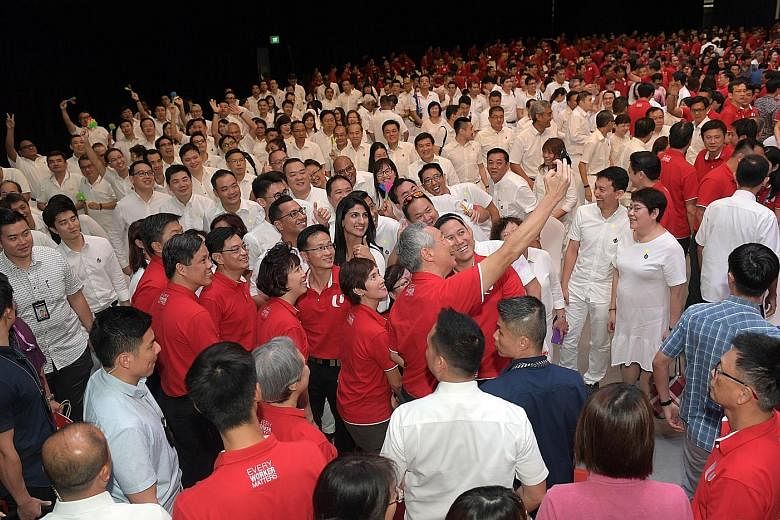Singapore might not have weathered its early crises or industrialised so rapidly were it not for the close relationship between the People's Action Party (PAP) and the National Trades Union Congress (NTUC), said Deputy Prime Minister Heng Swee Keat.
Faced with the threat of massive job losses in the early years of independence, the Government had to decisively welcome investors, industrialise and create jobs, he added in his first May Day Rally speech.
Unions had to evolve as well, he told around 1,600 unionists, workers, employers and Cabinet ministers at Downtown East yesterday.
"They were no longer just the mass base in the anti-colonial movement. We had to build a new nation, and unionists too had to become nation builders," said Mr Heng, who is Finance Minister as well.
He pointed to the 1969 NTUC Modernisation Seminar as a landmark event which also paved the way for tripartism. At the seminar, unionists agreed that trade unions had to go beyond collective bargaining.
If the labour movement had not transformed in the 1970s, it would have become irrelevant in post-independence Singapore and membership would have declined.
"To improve the lives of workers, unions had to become the co-drivers of our social and economic development," Mr Heng said. "And unions had to shift from confrontation to collaboration."
"NTUC's brand of progressive trade unionism has been critical in enabling our workers to stay ahead of changes," Mr Heng added.
The tripartite model helped in times of crises, like the 1985 recession when union leaders supported the Government's proposals of a two-year wage restraint and 15 per cent cut in Central Provident Fund contribution rates for employers.
"It was a bitter pill to swallow. But the unionists understood why we had to do this - to save jobs - and convinced their members," he said.
"Thanks to the support of workers, we managed to turn the economy around."
Along the way, government officials and unionists forged close working relationships, he noted.
Lauding the unionists who embarked on NTUC's modernisation journey 50 years ago, he noted that many who attended the seminar in 1969 had little formal education.
"Many of them did not speak English, and NTUC had to provide simultaneous translation into all four languages," he said.
"But these ordinary men and women had deep courage and the future in their bones, and they did extraordinary things," he added. "They modernised themselves, the movement and their country by the bootstraps. "
Noting the seminar was the product of a close NTUC-PAP symbiosis, Mr Heng cited political leaders who played leading roles in NTUC's modernisation, including Mr Ong Pang Boon and Mr Lim Kim San. Several presidents were also leaders in the labour movement - Mr Devan Nair, Mr S R Nathan and Mr Ong Teng Cheong, as well as current President Halimah Yacob.
"This close working relationship between the PAP and NTUC underpins our brand of tripartism. It remains as vital today as it was in 1969," said Mr Heng.
He also recounted the early days of the PAP-NTUC relationship.
The PAP had tried to revitalise the Singapore Trades Union Congress (STUC) after being elected to office in 1959, but the effort failed as there were both communists and non-communists in the STUC.
When the PAP split in 1961, the STUC also broke apart. Unions supporting the Barisan Sosialis formed the Singapore Association of Trade Unions, and those supporting the PAP formed the NTUC.
"But the PAP prevailed in the political struggle against the Barisan. And as a result, the NTUC too prevailed in the battle for the hearts and minds of workers," he said to applause from the audience.
"The heated political struggle of the 1960s was the crucible that forged the close bonds between the PAP and NTUC," he added.
"It was a close, symbiotic relationship from the beginning."


